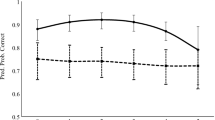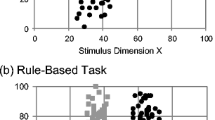Abstract
Enactment during the encoding of simple imperatives has been found to improve substantially performance on conceptually driven explicit-memory tests. In two experiments the effect of this manipulation on a conceptually driven implicit test (category association) was studied. A conceptually driven explicit test (free recall) was also included. In Experiment one three different study conditions (enactment with real objects, reading, and generation) were considered. In Experiment two there were two study conditions (enactment with imaginary objects and reading). Compared to reading, generation was found to improve the performance on both free recall and category association, whereas enactment affected free recall only. In a final experiment subjects imagined that they performed the tasks, and this manipulation was found to improve the memory performance on both tests. Taken together, this pattern of results is interpreted as suggesting that free recall and category association have a process in common that is sensitive to semantic processing at study (promoted by generation and imagery, but not by enactment), and that free recall involves a retrieval process in addition that is facilitated by a rich encoding environment (provided by enactment).
Similar content being viewed by others
References
Bäckman, L., & Nilsson, L.-G. (1985). Prerequisites for lack of age differences in memory performance. Experimental Aging Research, 11, 67–73.
Bäckman, L., Nilsson, L.-G., & Chalom, D. (1986), New evidence on the nature of the encoding of action events. Memory & Cognition, 14, 339–346.
Blaxton, T. (1989). Investigating dissociations among memory measures: Support for a transfer appropriate processing framework. Journal of Experimental Psychology: Learning, Memory, and Cognition, 15, 657–668.
Cohen, R. L. (1981). On the generality of some memory laws. Scandinavian Journal of Psychology, 22, 267–282.
Engelkamp, J., & Krumnacker, H. (1980). Imaginale und motorische Prozesse beim Behalten verbalen Materials. Zeitschrift für experimentelle und angewandte Psychologie, 28, 511–533.
Gardiner, J. M., Gregg, V. H., & Hampton, J. A. (1988) Word frequency and generation effects. Journal of Experimental Psychology: Learning, Memory, and Cognition, 14, 687–693.
Graf, P., & Schacter, D. (1985). Implicit and explicit memory for new associations in normal and amnesic subjects. Journal of Experimental Psychology: Learning, Memory, and Cognition, 11, 501–518.
Hamann, S. B. (1990). Level-of-processing effects in conceptually driven implicit tasks. Journal of Experimental Psychology: Learning, Memory, and Cognition, 16, 970–977.
Jacoby, L. L. (1983). Remembering the data: Analyzing interactive processes in reading. Journal of Verbal Learning and Verbal Behavior, 22, 485–508.
Jacoby, L. L., & Hollingshead, A. (1990). Toward a generate/recognize model of performance on direct and indirect tests of memory. Journal of Memory and Language, 29, 433–454.
Nilsson, L.-G. (1973). Category norms for verbal material. Report 135, University of Uppsala.
Roediger, H. L., & McDermott, K. B. (1993). Implicit memory in normal human subjects. In H. Spinnler & F. Boller (Eds.), Handbook of neuropsychology, Vol. 8 (pp. 63–131). Amsterdam: Elsevier.
Roediger, H. L., Weldon, M. S., & Challis, B. H. (1989). Explaining dissociations between implicit and explicit measures of retention: A processing account. In H. L. Roediger & F. I. M. Craik (Eds.), Varieties of memory and consciousness: Essays in honour of Endel Tulving (pp. 3–41). Hillsdale, N.J.: Erlbaum.
Srinivas, K., & Roediger, H. L. (1990). Classifying implicit memory tests: Category association and anagram solution. Journal of Memory and Language, 29, 389–412.
Tenpenny, P. L., & Shoben, E. J. (1992). Component processes and the utility of the conceptually-driven/data-driven distinction. Journal of Experimental Psychology: Learning, Memory and Cognition, 18, 25–42.
Author information
Authors and Affiliations
Corresponding author
Rights and permissions
About this article
Cite this article
Nyberg, L., Nilsson, LG. The role of enactment in implicit and explicit memory. Psychol. Res 57, 215–219 (1995). https://doi.org/10.1007/BF00431282
Issue Date:
DOI: https://doi.org/10.1007/BF00431282




